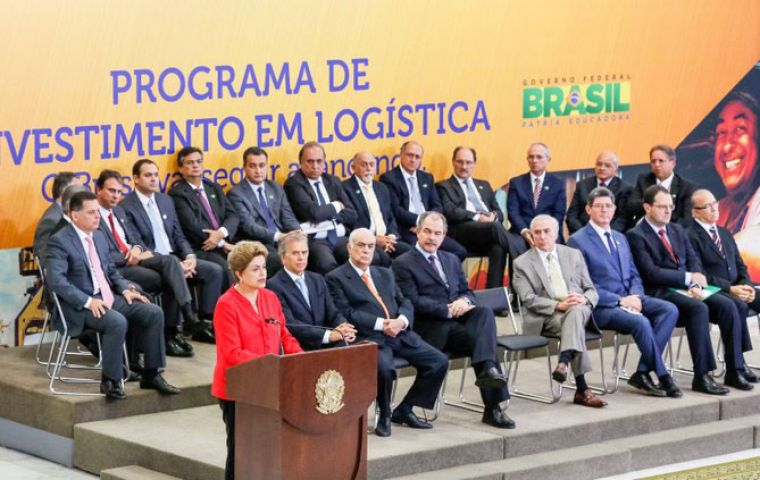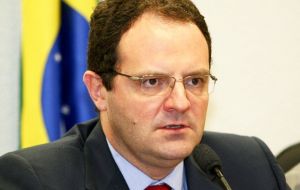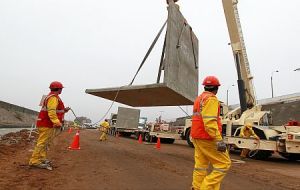MercoPress. South Atlantic News Agency
Brazil launches ambitious $64bn infrastructure package to prop the economy
 “Today is an important day in my second term. We're here especially to renew our commitment to the development of our country” said Rousseff.
“Today is an important day in my second term. We're here especially to renew our commitment to the development of our country” said Rousseff.  “The time has come to build the basis for a new cycle of development and growth for the country,” said Planning Minister Nelson Barbosa.
“The time has come to build the basis for a new cycle of development and growth for the country,” said Planning Minister Nelson Barbosa.  The spending plans come to $27.9 billion for railroads, $21.3 billion for highways, $12.1 billion for ports and $2.7 billion for airports.
The spending plans come to $27.9 billion for railroads, $21.3 billion for highways, $12.1 billion for ports and $2.7 billion for airports. Brazil announced a $64 billion infrastructure spending package on Tuesday, hoping to revive its flagging economy with investment in highways, railroads, ports and airports. Businesses and analysts have long pointed to overburdened infrastructure as a drag on the world's seventh-largest economy, which pays high prices to ship the raw materials it exports.
With Brazil facing its worst performance in 25 years -- the government forecasts a contraction of 1.2% in 2015 -- embattled President Dilma Rousseff is keen to reboot growth. Rousseff said it was time to “turn a page” at a ceremony on Tuesday at the Planalto Palace where the spending plan was announced.
“Today is an important day in my second term. We're here not just to announce big numbers and ambitious projects. We're here especially to renew our commitment to the development of our country,” she said.
The government said more than one-third of the new spending, 69.2 billion Reals ($22.3 billion), would come by the end of 2018, with the remaining 129.2 billion Reals laid out starting in 2019.
“The time has come to build the basis for a new cycle of development and growth for the country,” said Planning Minister Nelson Barbosa. “Increasing the rate of investment in Brazil is fundamental.”
In all, the spending plans come to $27.9 billion for railroads, $21.3 billion for highways, $12.1 billion for ports and $2.7 billion for airports. The government said it would also launch a series of measures to boost exports in tandem with the new program.
But it remains to be seen if the government will find bidders for the vast array of new projects.
A similar program launched in 2012 for more than 200 billion Reals only yielded deals to build one-fourth of the projects tendered, according to Brazilian newspaper Globo.
Sprawling Brazil, the world's fifth-largest country by surface area, needs expanded transport networks to carry the raw materials it supplies to the world, including iron ore, oil, coffee, sugar and soy.
One of the most ambitious projects is a trans-continental rail link connecting the Atlantic and Pacific oceans, giving Brazil a cheaper route to China, its top trade partner.
Chinese Prime Minister Li Keqiang announced during a visit last month that his country would help build the project, part of 53 billion dollars in investment deals.
The Brazilian economy is in its fifth sluggish year under Rousseff, and has never returned to the booming growth it posted under her predecessor and mentor, Lula da Silva.




Top Comments
Disclaimer & comment rules-

-

-

Read all commentsI was expecting a paragraph about the bidding process for all those Brazilian contractors expecting to benefit from this bonanza.
Jun 10th, 2015 - 07:18 am 0But I think those decisions were made in China and it didn't involve Brazilian contractors.
The 2012 programme was an abysmal failure.
Jun 10th, 2015 - 10:21 am 0Too little too late. They're going to have to ride this one out.
Jun 10th, 2015 - 11:58 am 0My guess is they'll be right back into the 90s economy after the slum dwellers start civil unrest and Dilma starts throwing $ at them to be quiet.
Commenting for this story is now closed.
If you have a Facebook account, become a fan and comment on our Facebook Page!